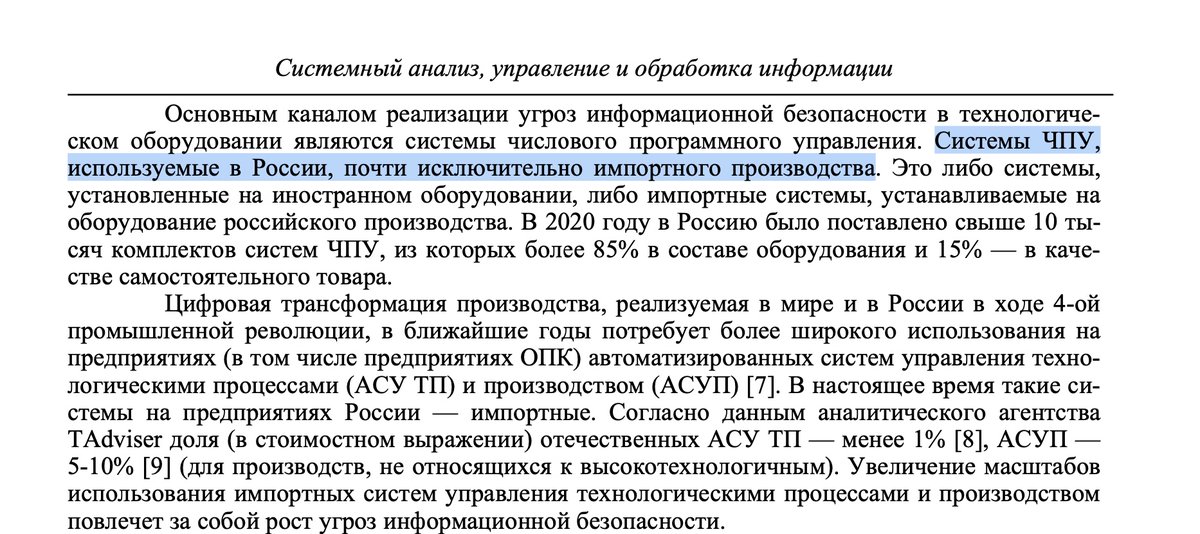Nothing would hamper the Russian war efforts more than the disconnection of German machines and software on the military plants. Is it possible? It's difficult to prove. What is easy to prove is that Russian industrialists feared such a backstabbing. Fortunately, they were wrong
The debate on a possibility of disconnection started in 2019. It was triggered by the Austrian LMF forcibly turning off their compressors on the Gazprom facility:
"they just turned them off through the satellite and it all turned into the scrap metal"
rbc.ru/business/15/10…
"they just turned them off through the satellite and it all turned into the scrap metal"
rbc.ru/business/15/10…
A source from Gazprom commented to the RBC:
"Typically contracts for compressor maintenance include the possibility of fixing its malfunctioning or turning it off remotely"
He made it clear that the old American or Swiss produced Gazprom compressors also risk being disconnected
"Typically contracts for compressor maintenance include the possibility of fixing its malfunctioning or turning it off remotely"
He made it clear that the old American or Swiss produced Gazprom compressors also risk being disconnected

Russian military industry works under a much harder secrecy regime and we don't know details of their contracts with equipment suppliers. But what we do know is that Russian industrialists and academicians fear it. Just one example from 2021 cyberleninka.ru/article/n/prob…
In 2021 the CEO of an Institute for the digital intellectual systems A. Zelensky argued that foreign machine tools might have undocumented capacities such as an option to remotely turn it off, establish its geolocation, get an info about the products made with this machine 

In Zelensky's opinion the CNC dependency is a major weak point of the Russian industry. Almost all CNC systems used in Russia are foreign produced. Which made him fear of the undocumented ways of remote control installed there 

Do I have direct evidencee that Western, mostly German suppliers could, turn off their equipment on the Russian military plants? That's very difficult to prove. What we do know is that Russian engineers feared that. Fortunately, Germany didn't backstab the Russian army. End of🧵
PS Daily reminder that most of software used on the Russian military plants is either #Siemens or #Heidenhain which are not questioned nearly enough for their role in keeping the Russian military industry afloat
Example from the КБ-1, Almaz-Antey corp. They produce air defense
Example from the КБ-1, Almaz-Antey corp. They produce air defense

Where I did take it from? Well, from YouTube. Who did post it? Igor Ashurbeyli, the Director for Science of the said КБ-1 and the CEO of the entire Almaz-Antey corporation


I'm absolutely serious. The (ex)CEO of a massive military Almaz-Antey corporation Ashurbeyli is uploading videos with unblurred tools and CNC from a secret facility to his YouTube for likes
That's a powerful counterpoint for "They are not that dumb to do X/Y" arguments. They are
That's a powerful counterpoint for "They are not that dumb to do X/Y" arguments. They are

The funniest thing is that he originally posted this video on his personal website ashurbeyli.ru but then posted in on YouTube, too
So basically he sacrificed any pretence of secrecy and made non sourcing too easy to get more views, likes, and comments. The end of 🧵
So basically he sacrificed any pretence of secrecy and made non sourcing too easy to get more views, likes, and comments. The end of 🧵

• • •
Missing some Tweet in this thread? You can try to
force a refresh





